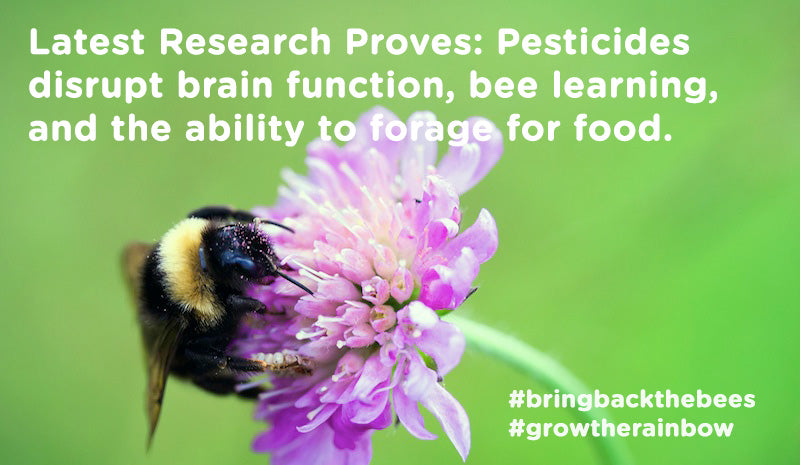Your Cart is Empty

"We can now be confident that at these levels, neonicotinoids disrupt brain function, bee learning and the ability to forage for food and so limit colony growth." - Dr Connolly, Dundee’s School of Medicine
It's been many years since pesticides have been suspected to be involved in bee colony collapse. Now the proof finally exists, in concrete, non-negotiable, definitive terms.
Research at the Universities of Dundee and St Andrews has confirmed that levels of neonicotinoid insecticides accepted to exist in agriculture cause both impairment of bumblebees’ brain cells and subsequent poor performance by bee colonies.
The contribution of the neonicotinoids to the global decline of insect pollinators is controversial and contested by many in the agriculture industry. However, the new research, published in the Journal of the Federation of American Societies for Experimental Biology, demonstrates for the first time that the low levels found in the nectar and pollen of plants is sufficient to deliver neuroactive levels to their site of action, the bee brain.
“Our research demonstrates beyond doubt that the level of neonicotinoids generally accepted as the average level present in the wild causes brain dysfunction and colonies to perform poorly when consumed by bumblebees,” he said. “In fact, our research showed that the ability to perturb brain cells can be found at 1/5 to 1/10 of the levels that people think are present in the wild.
“This is not surprising as pesticides are designed to affect brains of insects so it is doing what it is supposed to do but on a bumblebee as well as the pest species. The bumblebees don’t die due to exposure to neonicotinoids but their brains cells don’t perform well as a result and this causes adverse outcomes for individual bees and colonies.
“This is not proof that neonicotinoids are solely responsible for the decline in insect pollinators, but a clear linear relationship is now established. We can now be confident that at these levels, neonicotinoids disrupt brain function, bee learning and the ability to forage for food and so limit colony growth.
“It may be possible to help bees if more food (bee-friendly plants) were available to bees in the countryside and in our gardens. We suggest that the neonicotinoids are no longer used on any bee-friendly garden plants, or on land that is, or will be, used by crops visited by bees or other insect pollinators.”
Plant native wildflower seed balls in a fun an easy way with Seedles.
Sources:
[1] http://www.dundee.ac.uk/news/2015/bee-brains-and-colony-health-jeopardised-by-pesticide-exposure.php
[2] http://www.publications.parliament.uk/pa/cm201213/cmselect/cmenvaud/writev/668/668.pdf
Comments will be approved before showing up.